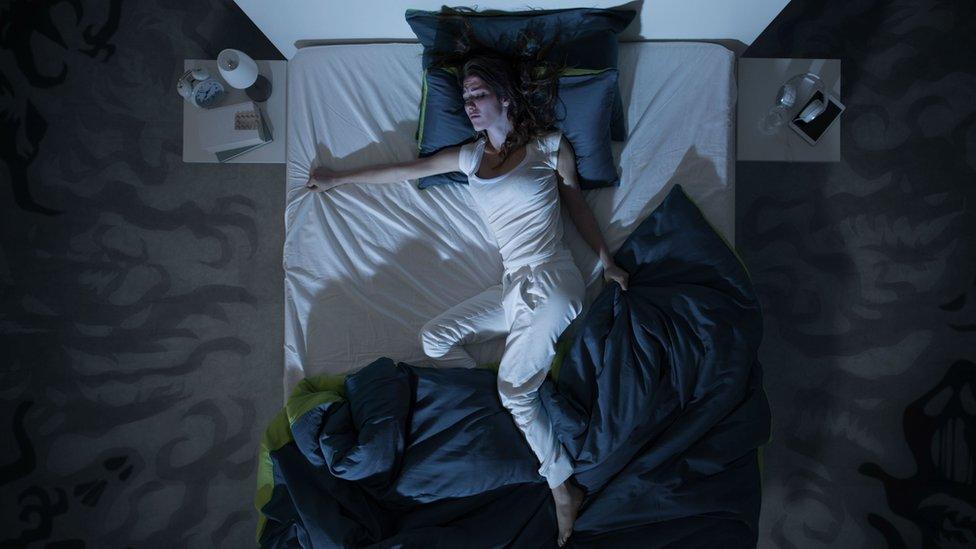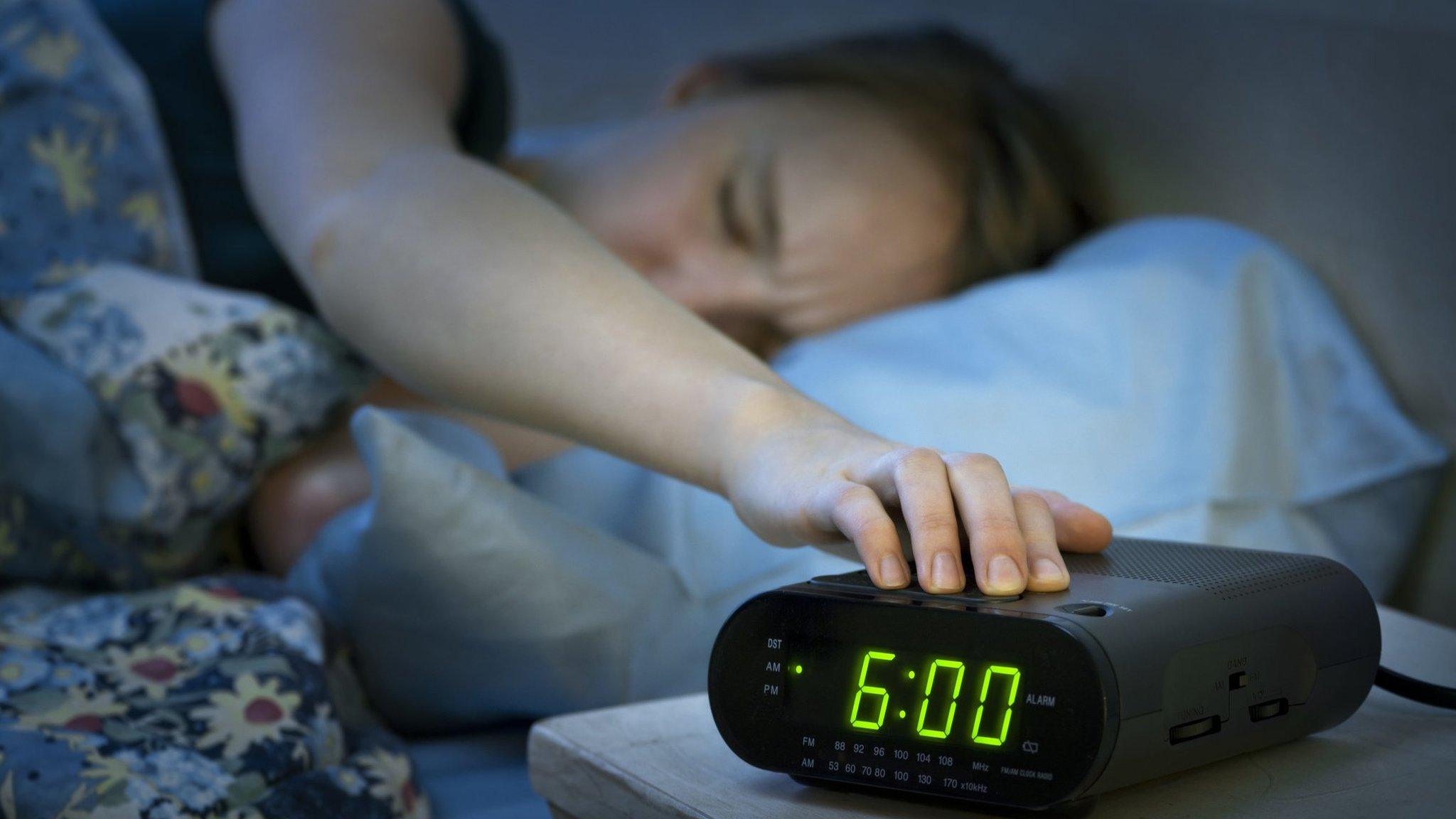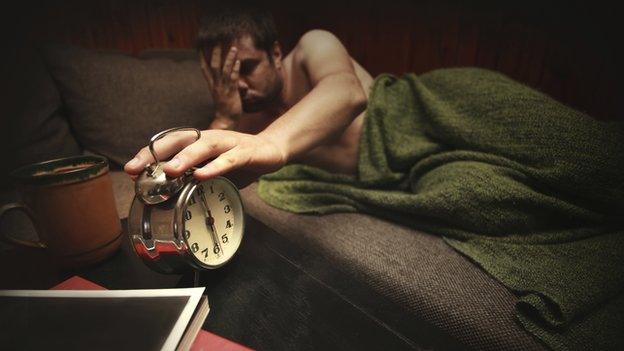Just a few nights of bad sleep upsets your brain
- Published

Thanks to the clocks going back, many of us managed to grab a little bit of extra shut-eye over the weekend.
And that's no bad thing because, as a country, we seem to be chronically sleep-deprived. According to the Sleep Council, the average Briton gets six-and-a-half hours sleep a night, which for most people is not enough.
Lots of studies have shown that cutting back on sleep, deliberately or otherwise, can have a serious impact on our bodies.
A few nights of bad sleep can really mess with our blood sugar control and encourage us to overeat. It even messes with our DNA.
A few years ago, Trust Me I'm a Doctor did an experiment with Surrey University, asking volunteers to cut down on their sleep by an hour a night for a week.
Dr Simon Archer, who helped run the experiment, found that getting an hour's less sleep a night affected the activity of a wide range of our volunteers' genes (around 500 in all) including some which are associated with inflammation and diabetes.
Disturbed nights
So the negative effects on our bodies of sleep deprivation are clear. But what effect does lack of sleep have on our mental health?
To find out Trust Me teamed up with sleep scientists at the University of Oxford to run a small experiment.
This time, we recruited four volunteers who normally sleep soundly. We fitted them with devices to accurately monitor their sleep and then, for the first three nights of our study, let them get a full, undisturbed eight hours.
For the next three nights, however, we restricted their sleep to just four hours.

Each day our volunteers filled in a psychological questionnaire designed to reveal any changes in their mood or emotions. They also kept video diaries. So what happened?
Sarah Reeve, a doctoral student who ran the experiment for us was surprised by how quickly their mood changed.
"There were increases in anxiety, depression and stress, also increases in paranoia and feelings of mistrust about other people", she said.
"Given that this happened after only three nights of sleep deprivation, that is pretty impressive."
Three of our four volunteers found the experience unpleasant, but one of them - Josh - claimed to be largely unaffected.
"This week probably hasn't taken as much of a toll as I thought it would on me," he said. "I feel perfectly fine - not happy, sad, stressed or anything."
Yet the tests we did on him showed something very different.
His positive emotions fell sharply after two nights of disturbed sleep, while negative emotions began to rise.
So even though he felt OK there were signs that he was, mentally, beginning to suffer.
'Stuck' in negative thoughts
The outcome of our small test reflects the results of a much bigger study looking at the impact of sleep deprivation on the mental health of students, external.
Researchers recruited more than 3,700 university students from across the UK who had reported problems sleeping and randomised them into two groups.
One group received six sessions of online CBT (cognitive behavioural therapy) aimed at improving their sleep; the other group got standard advice.
Ten weeks into the study, the students who received CBT reported a halving in rates of insomnia, accompanied by significant improvements in scores for depression and anxiety, plus big reductions in paranoia and hallucinations.
This is thought to be the largest ever randomised controlled trial of a psychological treatment for mental health, and it strongly suggests that insomnia can cause mental health problems rather than simply be a consequence of them.
Daniel Freeman, professor of clinical psychology at Oxford University, who led that study thinks one of the reasons why sleep deprivation is so bad for our brains is because it encourages repetitive negative thinking.
"We have more negative thoughts when we're sleep-deprived and we get stuck in them," he said.
Reassuringly he doesn't think a few nights of bad sleep means you will become mentally ill. But he does think it increases the risk.
"It's certainly not inevitable," he said. "In any one night, one in three people is having difficulty sleeping, perhaps 5% to 10% of the general population has insomnia, and many people get on with their lives and they cope with it. But it does raise the risk of a whole range of mental health difficulties."
The positive side of this research is it implies that helping people get a good night's sleep will go a long way to helping improve our sense of well-being.
Norbert Schwarz, a professor of psychology at the University of Southern California, has even put a figure on it.
He claims: "Making $60,000 (£48,400) more in annual income has less of an effect on your daily happiness than getting one extra hour of sleep a night."
So, sleep well.
Trust Me I'm a Doctor - Mental Health Special is on BBC2 at 21:00 GMT on Wednesday 1 November .
- Published28 October 2017

- Published26 June 2017
- Published9 October 2013
